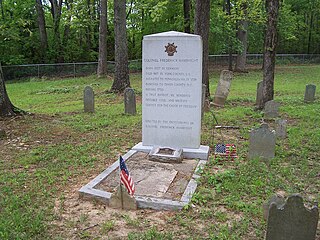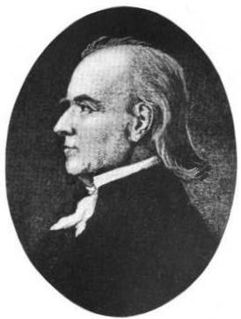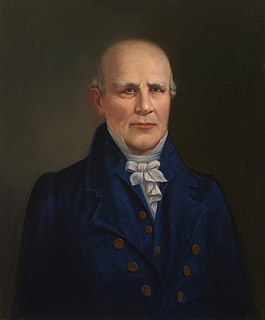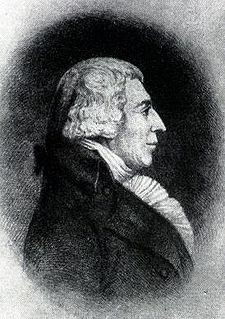 W
WRobert Burton was an American farmer, Revolutionary War officer, and planter in what is now Vance County, North Carolina. He was a delegate from North Carolina to the Continental Congress in 1787. Between 1783 and 1815, the North Carolina General Assembly elected him to 13 one-year terms on the Council of State, which at the time was an official advisory panel that the legislature used to check the governor's power.
 W
WRichard Caswell was an American politician and lawyer who served as the first and fifth governor of the state of North Carolina from 1776 to 1780 and from 1785 to 1787. He also served as a senior officer of militia in the Southern Theater of the American Revolutionary War. He was a signatory of the Continental Association and thus considered one of the Founding Fathers of the United States.
 W
WBenjamin Cleveland was an American pioneer and officer in the North Carolina militia. He is best remembered for his service as a colonel in the Wilkes County Regiment of the North Carolina militia during the War of Independence, and in particular for his role in the American victory at the Battle of Kings Mountain.
 W
WWilliam Lee Davidson (1746–1781) was an officer in the North Carolina militia and Continental Army during the American Revolutionary War. He was born in Pennsylvania and moved with his family to Rowan County, North Carolina in 1750. He was killed at the Battle of Cowan's Ford.
 W
WWilliam Richardson Davie was a military officer and the 10th Governor of North Carolina from 1798 to 1799, as well as one of the most important men involved in the founding of the University of North Carolina. He was a member of the Federalist Party and served as a delegate to the Constitutional Convention as a representative of the state of North Carolina. He is a "Founding Father of the United States".
 W
WJordi Farragut Mesquida, anglicized as George Farragut, was a British-born American naval officer during the American Revolutionary War. He also fought with the Continental Army in battles in the South. After commanding a Spanish trading ship in the Gulf of Mexico and Caribbean, he had joined the South Carolina Navy as a lieutenant when the war broke out. He anglicized his Catalan name when he joined the South Carolina Navy.
 W
WJames Gillespie was a Democratic-Republican U.S. Congressman from North Carolina between 1793 and 1799.
 W
WJoseph Graham was a Revolutionary War militia officer, politician, and wealthy ironmonger from Mecklenburg County, North Carolina.
 W
WRev. James Hall, D.D. was a Presbyterian minister, chaplain in the Rowan County Regiment during the American Revolution, educator, and missionary in the Natchez area of the Mississippi Territory. He helped to found the Fourth Creek Congregation as its second minister. He was the first minister of Concord Presbyterian Church and Bethany Presbyterian Church in Iredell County, North Carolina on April 8, 1778.
 W
WFrederick Hambright was a military officer who fought in both the local militia and in the North Carolina Line of the Continental Army during the Revolutionary War. He is best known for his participation in the Battle of Kings Mountain in 1780. Serving as a statesman early in the Revolution, Hambright joined the War in 1777, ranked a lieutenant colonel in a local militia. His early actions were limited to occasional checks on Loyalist groups. This changed in 1780 with Hambright's important role at the Battle of Kings Mountain, which occurred near his lands in the newly formed Lincoln County, North Carolina. Hambright was commended for his bravery during the battle, though suffering a wound which forced him to permanently resign from military service.
 W
WPhilemon Hawkins II was a planter, an officer in the North Carolina militia during the American Revolution, and a public officeholder in North Carolina.
 W
WRichard Henderson was an American jurist, land speculator and politician who was best known for attempting to create the Transylvania Colony in frontier Kentucky. Henderson County and its seat Henderson, Kentucky are named for him. He also sold land to an early settlement that went on to become Nashville, Tennessee.
 W
WAllen Jones was an American planter, American Revolution brigadier general of the Halifax District Brigade, and statesman from Edgecombe County, North Carolina.
 W
WJames Kenan (1740–1810) was an American military officer and politician who served as a brigadier general of the Wilmington District Brigade during the American Revolutionary War and commander of the North Carolina militia after the war. He was active in North Carolina politics and served ten terms as a state senator.
 W
WWilliam Lenoir was an American Revolutionary War officer and prominent statesman in late 18th-century and early 19th-century North Carolina. Both the City of Lenoir, North Carolina and Lenoir County, North Carolina are named for him. Additionally, Lenoir City, Tennessee is jointly named for him and for his son, William Ballard Lenoir. The USS Lenoir (AKA-74) was also (indirectly) named for him.
 W
WNathaniel Macon was an American politician who represented North Carolina in both houses of Congress. He was the fifth Speaker of the House, serving from 1801 to 1807. He was a member of the United States House of Representatives from 1791 to 1815 and a member of the United States Senate from 1815 to 1828. He opposed ratification of the United States Constitution and the Federalist economic policies of Alexander Hamilton. Thomas Jefferson dubbed him "Ultimas Romanorum"—“the last of the Romans”, like Flavius Aetius.
 W
WAlexander Martin was the fourth and seventh governor of North Carolina from 1782 to 1784 and from 1789 to 1792.
 W
WJoseph "Quaker Meadows" McDowell Jr. was an American planter, soldier, and statesman from North Carolina. He was known as "Quaker Meadows Joe" to distinguish him from his cousin Joseph "Pleasant Gardens" McDowell, who was also a legislator and American Revolutionary War officer from North Carolina. The two men are not always clearly distinguished in historical records; both were in the 1780 Battle of Kings Mountain, one as a major in the Burke County Regiment of the North Carolina militia, and the other in a subordinate role as a captain.
 W
WAbner Nash was the second Governor of the U.S. state of North Carolina between 1781 and 1782, and represented North Carolina in the Continental Congress from 1782 to 1786.
 W
WJohn Rhea was an American soldier and politician of the early 19th century who represented Tennessee in the United States House of Representatives. Rhea County, Tennessee and Rheatown, a community and former city in Greene County, Tennessee is named for him.
 W
WJames Robertson was an American explorer, soldier and Indian agent, and one of the founding fathers of what became the State of Tennessee. An early companion of explorer Daniel Boone, Robertson helped establish the Watauga Association in the early 1770s, and to defend Fort Watauga from an attack by Cherokee in 1776. In 1779, he co-founded what is now Nashville, and was instrumental in the settlement of Middle Tennessee. He served as a brigadier general in the Southwest Territory militia in the early 1790s, and as an Indian Commissioner in later life.
 W
WGriffith Rutherford was an officer in the American Revolutionary War, a political leader in North Carolina, and an important figure in the early history of the Southwest Territory and the state of Tennessee.
 W
WJohn Sevier was an American soldier, frontiersman, and politician, and one of the founding fathers of the State of Tennessee. He played a leading role in Tennessee's pre-statehood period, both militarily and politically, and he was elected the state's first governor in 1796. He served as a colonel of the Washington District Regiment in the Battle of Kings Mountain in 1780, and he commanded the frontier militia in dozens of battles against the Cherokee in the 1780s and 1790s.
 W
WWilliam "Billy" Sharpe was a lawyer, politician, American Revolution patriot, and a delegate to the Continental Congress from Rowan County, North Carolina, which became Iredell County in 1788.
 W
WIsaac Shelby was the first and fifth Governor of Kentucky and served in the state legislatures of Virginia and North Carolina. He was also a soldier in Lord Dunmore's War, the American Revolutionary War, and the War of 1812. While governor, he led the Kentucky militia in the Battle of the Thames, an action that was rewarded with a Congressional Gold Medal. Counties in nine states, and several cities and military bases, have been named in his honor. His fondness for John Dickinson's "The Liberty Song" is believed to be the reason Kentucky adopted the state motto "United we stand, divided we fall".
 W
WRichard Dobbs Spaight was an American politician, planter, and signer of the United States Constitution, who served as a Democratic-Republican U.S. Representative for North Carolina's 10th congressional district from 1798 to 1801. Spaight previously served as the eighth governor of North Carolina from 1792 to 1795. He ran for the North Carolina State Senate in 1802, and Federalist U.S. Congressman John Stanly campaigned against him as unworthy. Taking offense, Stanly challenged him to a duel on September 5, 1802, in which Stanly shot and mortally wounded Spaight, who died the following day.
 W
WCaptain Hezekiah Spruill was born and died in Tyrrell County, North Carolina. Spruill was an early planter, a member of the North Carolina Provincial Congress and a Captain in the 2nd Battalion of militia in North Carolina.
 W
WHugh Waddell was a prominent military figure in the Province of North Carolina during its control by the Kingdom of Great Britain. Waddell formed and led a provincial militia unit in Rowan County, North Carolina and the Ohio River Valley during the French and Indian War and the Anglo-Cherokee War, and supervised the construction of Fort Dobbs near the settlement of the Fourth Creek Congregation. His career was well-served by close connections to several provincial governors of North Carolina.
 W
WHugh Williamson was an American physician and politician. He is best known as a signatory to the U.S. Constitution, and for representing North Carolina at the Constitutional Convention.
 W
WLieutenant Colonel Joseph Winston was an American pioneer, planter and American Revolutionary War hero from Surry County, North Carolina, and the first cousin of statesman and Virginia governor Patrick Henry. He also served in the United States House of Representatives and North Carolina Senate. In 1766, Winston moved to the northern part of Rowan County, North Carolina, the area which subsequently became the current Stokes County, North Carolina.